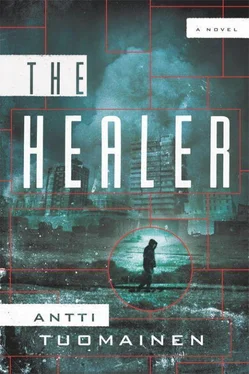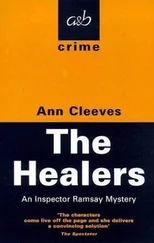I nodded.
“Do you still write your poetry?”
I expected this. He couldn’t resist needling me. The question had the seed of the next question in it. It was meant to indicate that I was on the wrong track when it came to Johanna just like I was when it came to everything else. So what. I decided to give him a chance to continue in the vein he’d chosen. I answered honestly.
“Yes.”
“When was the last time you were published?”
Once again, I didn’t need to think about my answer.
“Four years ago,” I said.
He didn’t say anything more, just looked at me with red-rimmed, satisfied eyes like he’d just proven some theory of his to be correct. I didn’t want to talk about it anymore. It would have been a waste of time.
“Where does Johanna sit?” I asked.
“Why?”
“I want to see her workstation.”
“Normally I wouldn’t allow it,” Lassi said, looking like his last bit of interest in the whole matter had just evaporated. He glanced nonchalantly past me at the office full of cubicles, which he could see through the glass wall. “But I guess there’s not much we do normally anymore, and the office is empty, so go ahead.”
I got up and thanked him, but he’d already turned toward his monitor and become absorbed in his typing, as if he’d wished he were someplace else the whole time.
Johanna’s workstation was easy to find on the right side of the large, open office. A picture of me led me to it.
Something lurched inside me when I saw the old snapshot and imagined Johanna looking at it. Could she see the same difference in my eyes that I saw?
In spite of the large stacks of paper, her desk was well organized. Her closed laptop lay in the middle of the table. I sat down and looked around. There were a dozen or more workstations, which the reporters called clovers, in the open office space, with four desks at each station. Johanna’s desk was on the window side and had a direct view into Lassi’s office. Or rather, the upper section of his office—cardboard was stacked against the lower half of the glass walls. The view from the window wasn’t much to look at. The Kiasma art museum with its frequently patched copper roof loomed like a gigantic shipwreck in the rain—black, tattered, run aground.
The top of the desk was cool to the touch but quickly grew damp under my hand. I glanced toward Lassi Uutela’s office and then looked around. The place was deserted. I slid Johanna’s computer into my bag.
There were dozens of sticky notes on the desk. Some of them simply had a phone number or a name and address; a few were complete notes written in Johanna’s precise, delicate hand.
I looked through them one by one. There was one in the most recent batch that caught my attention: “H—West–East/ North–South” then two lists of neighborhoods—“Tapiola, Lauttasaari, Kamppi, Kulosaari” and “Tuomarinkylä, Pakila, Kumpula, Kluuvi, Punavuori”—with dates next to them.
“H” must mean the Healer. I shoved the note in my pocket.
Next I went through the piles of papers. Most of them were about pieces Johanna had already written: articles about the alleged closing of Russia’s nuclear power plants, the dwindling Finnish tax base, the collapse in food quality.
One pile was entirely about the Healer. It included printed copies of all his e-mails. Johanna had written her own notes on the printouts, so many on some that they nearly obscured the original text. I crammed the whole stack into my bag without reading them, got up, and stood looking at the abandoned desk. It was like any other desk, impersonal and indistinguishable from a million others. Still, I hoped it would tell me something, reveal what had happened. I waited a moment, but the desk was still just a desk.
Twenty-four hours earlier, Johanna had sat here.
And she would still be sitting here, if something hadn’t happened to her.
I couldn’t explain why I was so sure of it. It was as hard to define as the connection between us. I knew that Johanna would call me, if only she could.
I took a step away from the desk, unable at first to take my eyes off her papers, her handwriting, the little objects on the table. Then I remembered something.
I went back to the door of Lassi Uutela’s office. He took no notice of me, so I knocked on the door frame. The plastic cracked against the back of my hand. I was surprised at the loud, hollow sound it made. Lassi stopped his hurriedly typing fingers and left his hands waiting in the air as he turned his head. The irritation in his red-rimmed eyes didn’t seem to have diminished.
I asked which photographer had been on the job with Johanna, although I had already guessed who it was.
“Gromov,” Lassi growled.
I knew him, of course. I’d even met him. Tall, dark, and handsome. Something of a ladies’ man, according to Johanna, obsessive when it came to his work, and apparently in everything else as well. Johanna respected Vasili Gromov’s skill at his job and liked working with him. They had spent a lot of time together on jobs in Finland and abroad. If anyone had any information about Johanna, it would be him.
I asked Lassi if he’d seen Gromov. He understood immediately what I meant. He picked up his telephone, leaned his head against the headrest on his chair, and aimed his gaze at the ceiling, either toward the air conditioner duct or toward heaven.
“This world’s a fucking mess,” he said quietly.
As I made my way home, Lassi’s questions about why I was still writing poetry rose up in my mind again. I hadn’t told him what I was thinking. I didn’t want to. Lassi wasn’t a person you confided in or trusted any more than you had to. But what would I have said, what reason would I have given, for keeping at something that had no future? I would have told him the truth.
To keep writing was to keep living. And I didn’t keep living or writing to find readers. People were trying to survive from one day to the next, and poetry didn’t have much to do with it. My reasons for writing were completely selfish.
Writing gave my days a shape, a routine. The words, the sentences, the short lines, brought an order to my life that had disappeared all around me. Writing meant that the fragile thread between yesterday, today, and tomorrow was still unbroken.
I tried to read Johanna’s papers, but I couldn’t concentrate on anything because of the clatter of beer cans and other trash on the bus. They were thrown there by drunken teenagers who were no real danger to the other passengers, but it was still annoying. The late-night routes were another matter, especially the ones without security guards.
I got off the bus at the Herttoniemi metro station. I gave a wide berth to a gang of drunken skinheads—a dozen bald scalps that shone with rain and tattoos—avoided the persistent panhandlers patrolling in front of the shops, and headed toward home in the dark evening. There was a break in the rain, and the strong, gusting wind couldn’t decide which direction to blow. It lunged here and there, grabbing onto everything with its strong hands, including the brightly lit security lights on the walls of the buildings, which made it look as if the houses themselves were swaying in the evening darkness. I walked briskly past the day care that had first been abandoned by children, then scrawled on by random passersby, and finally set on fire. The church at the other side of the intersection had an emergency shelter for the homeless, and it looked like it was full to the brim—the previously bright vestibule was halfdim with people. A few minutes later I turned onto the path to our apartment building.
The roof of the building opposite had been torn off in an autumn storm and still hadn’t been repaired, and the top-floor apartments were dark. Soon we would be facing the same thing, like people in a thousand other buildings. They weren’t designed for continuous high winds and rain for half the year, and by the time people realized that the wind and rain were here to stay it was too late. Besides, no one had the money or the interest to keep up a building where power and water outages made living unpleasant and probably eventually impossible.
Читать дальше












